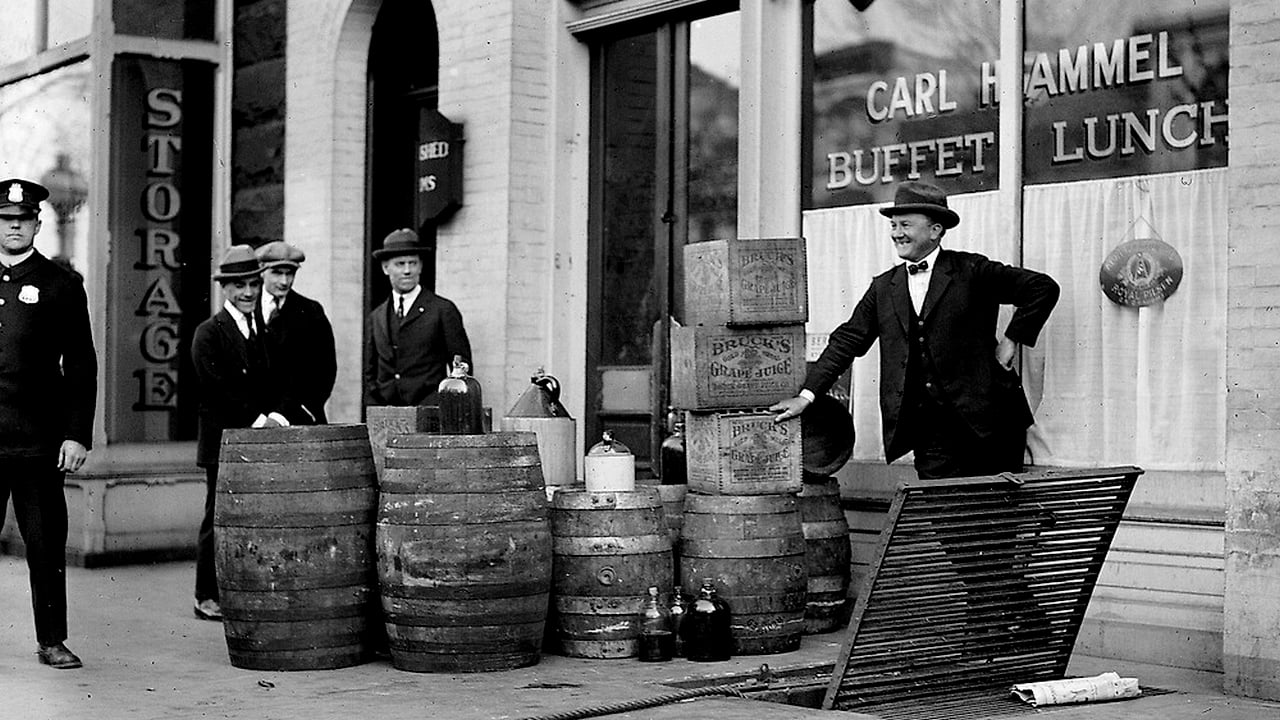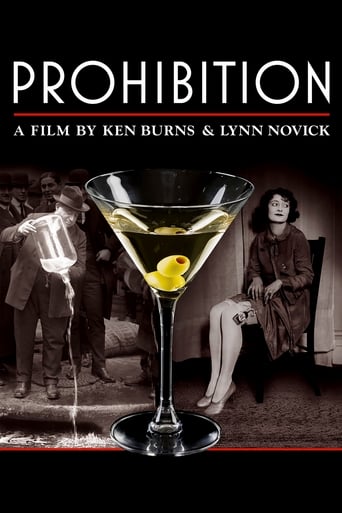

This huge three-part series covers a lot of ground on not only the failed prohibition laws in the US but also of America's turbulent love affair with alcohol.
... View MoreAny Ken Burns documentary is going to be smart, well made and educational. This one is also fun (in the plus column), but lacks the emotion, ambition and power of his very best work, like "The Civil War" or "The Central Park Five". Made with a ton of great movie footage and stills, and lots of tid-bits about the history of drinking in America -- it's out of control pervasiveness among men, especially working class men, that led to the push for prohibition that puts the now ridiculous seeming constitutional amendment in a somewhat more understandable light. That in turn explains the odd confluence of its backers, from religious conservatives, to well meaning social progressives looking to save the poor from themselves, to blue-blood WASPS who hated working class immigrants who drank more openly, to women fighting for the right to vote, and who saw how often alcohol contributed to domestic violence. The film also does a great job in showing how a law that tens of millions of Americans will simply ignore is much worse than no law at all, as it sows the seeds of disregard and contempt for the law, as well creating a fertile ground for criminals to give people what they want in a black market. Much the same arguments are going on right now about other "vice" laws, from marijuana, to prostitution, to proposed laws on fatty and sugary foods. One of the central questions of any democracy is how much and where does the government have a right to intrude into people's lives for the greater good. It's an important and complicated question, and one the series does a good job of raising. But at over 5 hours it starts to run a little thin, and the points and stories start to get a bit repetitive. I'm glad I saw it, and enjoyed myself quite a bit, but unlike many documentaries by Burns (and his equally talented brother Ric), I don't think I'll feel a need to re-watch it anytime soon.
... View MoreThis is the latest documentary series from Ken Burns--the docu-god for Public Broadcasting. Not surprisingly, with his amazing reputation for perfection, he was able to once again get many of America's top actors to provide their voice talents to the shows--such as Tom Hanks, Sam Waterston and Blythe Danner. And, like so many PBS documentaries, Peter Coyote narrates more than capably.The miniseries consists of three episodes. The first is about the background leading to Prohibition--the temperance movement and problems with alcohol over-consumption. It also ends with the implementation of the Constitutional Amendment. Part Two is about the practical aspects of the law. The difficulty in enforcement is due to a lack of widespread support, loopholes in the law as well as the way the law actually ENCOURAGED the growth of organized crime. Part Three is about the rising dislike of the law that led to its repeal.Overall, it's yet another very good series by Ken Burn and is among the best shows you can find on the topic. Well worth your time--and it manages to make an educational show fun...of sorts.
... View MoreYou know, it's OBVIOUS, that this was done by PBS. Within the first 5 minutes the term spousal RAPE is used! Hey I came here to learn about prohibition, sheesh! All the people contributing in the first episode are all liberals. I mean can we get some freaking balance in this stuff with PBS? They hurt themselves by being so liberal. Cases in point. They talk about all the political sides who supported temperance but they never use the word "liberal" and never use the word "communist" I mean you know what part I am talking about when they say "progressive" and "radical".Also, the old drunk looking dude makes the sly comment that now Jesus would be put in jail for turning water into wine. Hey smart guy, Jesus did not SELL the wine. Why did they have to go there? Looking at the credits while typing this John Lithgow, Tom Hanks, Sam Waterston, this program is loaded with liberals, are there any non liberal contributors in this? Look up Noah Feldman's wiki page, he is in most of this episode as a commentator expert, that guy is a poster child leading elitist liberal.For full disclosure, I am a drinker, non evangelical, and I happen to live in a Muslim country thats dry and break it's laws in much hazard to myself because I want a drink. I'm only putting this review out here to raise the case that PBS is not the unbiased network it has always said it is. It would serve it's own purposes better if it was truly open minded. Stop with the NPR "all things considered" treatment, talking down to us, you wont convince us that you are correct anymore. Interesting material, definitely done to entertain a liberal viewership which I guess is all PBS has left, it's a shame that all things were NOT considered. 6 of 10, I learned that the bible thumpers got us an income tax in an alliance with "progressives".I have about zero trust that this series will cover all bases or just focus on the lower class's drinks like beer. Lets see where they go with wine and hard liquor which the rich enjoy now. They mention Kennedy's (JFK) grandfather but lets see them mention his father Joe Sr, frankly I cannot see how they could NOT mention him, but it IS PBS so anything is possible when liberals write their own history.
... View More